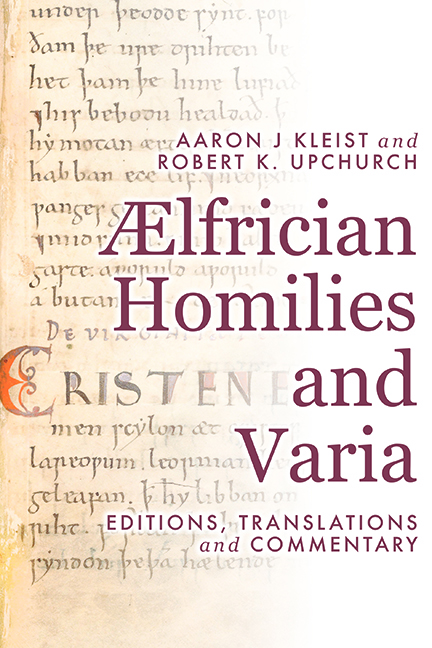Book contents
- Frontmatter
- Contents
- Preface
- Acknowledgements
- Abbreviations
- Sigla for Cited Ælfrician Manuscripts
- Dates for Cited Ælfrician Works
- Editorial Conventions
- Conventions Used in the Commentaries
- Homilies The Proper of the Season
- Homilies The Proper of the Saints
- Ælfrician Homilies and Varia: Editions, Translations, and Commentary: Volume II
- Homilies The Common of the Saints
- Homilies Unspecified Occasions
- Varia
- Works Cited
- Index
- ANGLO-SAXON TEXTS
5 - Third Sunday after Easter: Modicum et iam non uidebitis me (‘A Little While and then You Will Not See Me’ [John 16.16–22])
Published online by Cambridge University Press: 05 March 2024
- Frontmatter
- Contents
- Preface
- Acknowledgements
- Abbreviations
- Sigla for Cited Ælfrician Manuscripts
- Dates for Cited Ælfrician Works
- Editorial Conventions
- Conventions Used in the Commentaries
- Homilies The Proper of the Season
- Homilies The Proper of the Saints
- Ælfrician Homilies and Varia: Editions, Translations, and Commentary: Volume II
- Homilies The Common of the Saints
- Homilies Unspecified Occasions
- Varia
- Works Cited
- Index
- ANGLO-SAXON TEXTS
Summary
Modicum et iam non uidebitis me (‘A Little While and then You Will Not See Me’) is Ælfric's homily for the Third Sunday after Easter, and our editorial title reflects the opening words of the first verse of the day's pericope, John 16.16–22. The reading for the day is a portion of the Last Supper Discourses in John 14–17 that Jesus delivers to his disciples after washing their feet and predicting Judas’ betrayal and Peter's denial. Here Jesus announces that his disciples will soon see him no more and soon thereafter will see him again, prompting their confusion and thus his comfort that their grief will be turned to joy. Because Ælfric wrote about this moment near the end of Jesus’ life very near the end of his own, Modicum bears witness to his indefatigableness as he composed new works (and revised old ones) within a few years of his death around 1010.
Ælfric wrote Modicum between about 1006 and 1010, a period during which he focused on expanding his series of temporale homilies for Sundays and non-saints’ feast-days linked to Easter. As early as 993 he had begun supplying pericope homilies for occasions not covered in the Catholic Homilies, and between 1002 and 1005 the first stage of a series known as Temporale Homilies I (TH I) took shape. Between 1006 and 1010, a second stage, Temporale Homilies II (TH II), emerged. At that time Ælfric appears to ‘have expanded his temporaleseries from forty homilies running from Christmas to the First Sunday after Pentecost (TH I) to seventy-two homilies [fifty-two now extant] spanning the liturgical year and focusing particularly on the exposition of pericopes (TH II)’. AH I.5 is one of ten surviving new pericope homilies he composed for TH II. One sermon is for Christmas, seven focus on the period after Pentecost, one is Ælfric's only extant homily for a Wednesday in Lent, and Modicum completes a run of five Sundays after Easter before Ascension Sunday. He had completed runs of five pericope homilies for the Sundays and Fridays in Lent, so his composition of Modicum suggests that the provision of homilies for the five Sundays after Easter was equally important to him.
- Type
- Chapter
- Information
- Ælfrician Homilies and VariaEditions, Translations, and Commentary, pp. 323 - 352Publisher: Boydell & BrewerPrint publication year: 2022



